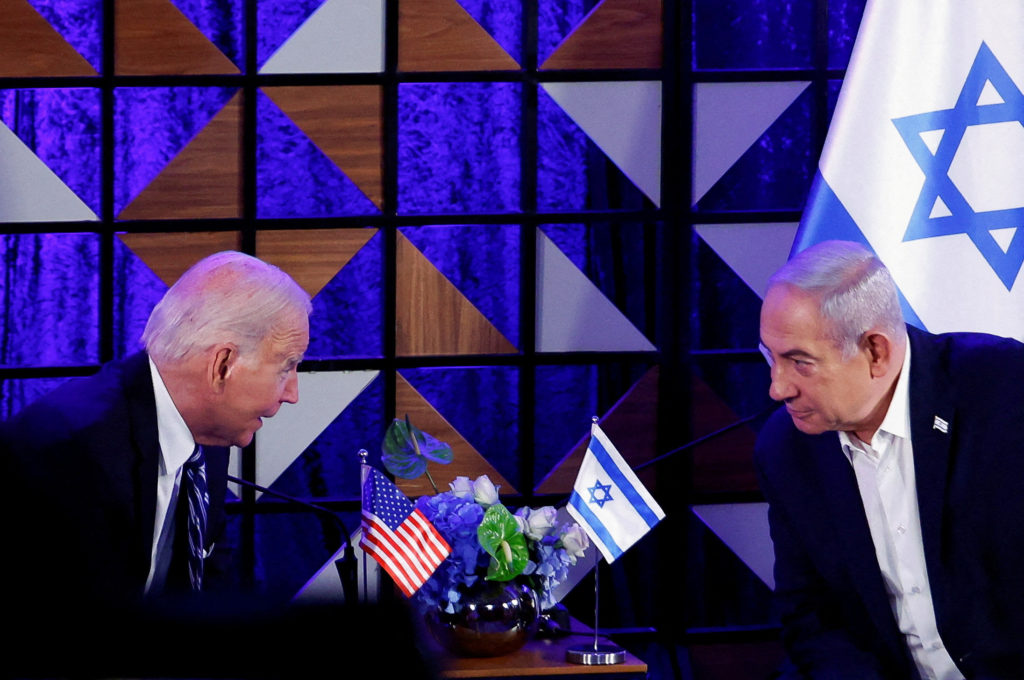Article, U.S.
Netanyahu’s Rejection of Palestinian Statehood Sparks Tensions with Biden

FILE PHOTO: U.S. President Joe Biden attends a meeting with Israeli Prime Minister Benjamin Netanyahu, as he visits Israel amid the ongoing conflict between Israel and Hamas, in Tel Aviv, Israel, October 18, 2023. REUTERS/Evelyn Hockstein/File Photo
Israeli Prime Minister Benjamin Netanyahu’s recent rejection of the idea of creating a Palestinian state has ignited tensions between the United States and Israel. The move is seen as a significant departure from the position advocated by one of Netanyahu’s staunchest allies, U.S. President Joe Biden, who has long supported a two-state solution to the Israeli-Palestinian conflict.
Clashing Visions: Netanyahu’s Firm Stance
During a news conference in Tel Aviv on Thursday, Netanyahu said that Israel needs security control over all territory west of the Jordan River. This position directly contradicts the concept of Palestinian sovereignty, leading to concerns and disagreements between the long-time allies.
“This conflict is not about the absence of a (Palestinian) state but about the existence of a state, the Jewish state,” Netanyahu stated.
President Biden, a vocal supporter of a two-state solution, responded to Netanyahu’s stance, asserting that the rejection of all forms of two-state solutions was not the path forward.
“We will continue to work toward the right outcome, particularly on issues where we strongly disagree,” mentioned a senior U.S. administration official.
Amid the public rift, both leaders engaged in behind-the-scenes diplomacy with a phone call between the two leaders. Biden’s call with Netanyahu was the first in nearly a month, the White House said
Netanyahu’s reversal on hardline positions in the past led U.S. officials to view his latest comments as potentially subject to change.
The complexity of the situation was acknowledged by a senior administration official, stating, “If we took such statements as the final word, there would be no humanitarian assistance going into Gaza and no hostages released.”
President Biden, who has faced pro-Palestinian protests urging him to call for a ceasefire, reiterated his commitment to a two-state solution. He said Israel needs to focus on saving civilian lives and called for a regional approach that includes a pathway to a Palestinian state.
“There are a number of types of two-state solutions,” Biden said. “There’s a number of countries that are members of the UN that … don’t have their own military; a number of states that have limitations, and so I think there’s ways in which this can work.”
He was less clear exactly how he would achieve it.
“I’ll let you know when I get him to agree,” Biden told reporters.
Biden and Netanyahu also discussed efforts to secure the remaining hostages held by Hamas, and Israel’s shift to more “targeted” operations in Gaza to allow more humanitarian assistance to come through, the White House said.
Pressure Mounts on Netanyahu
The Israeli prime minister’s office said in a statement Saturday: “In his conversation with President Biden, Prime Minister Netanyahu reiterated his policy that after Hamas is destroyed Israel must retain security control over Gaza to ensure that Gaza will no longer pose a threat to Israel, a requirement that contradicts the demand for Palestinian sovereignty.”
The humanitarian crisis in Gaza continues to escalate as the health ministry in Gaza reported a death toll of at least 24,927 since the war broke out on October 7. The United Nations has expressed concerns about displacement, urging better aid access to address the looming famine and disease.
“This war has displaced roughly 85 per cent of Gaza’s people. Better aid access is needed urgently as famine and disease loom,” warned a UN spokesperson.
Netanyahu is under pressure from the Israeli public due to the ongoing hostage situation resulting from Hamas’ attack and perceived security failures. Failing to secure the release of the hostages would increase political pressure on Netanyahu, whose popularity among Israelis has declined since October 7.
Amid calls for his resignation, Netanyahu asserted in a news conference that those urging him to step down are essentially advocating for the creation of a Palestinian state.
“Those who talk about the day after Netanyahu are actually talking about the establishment of a Palestinian state,” he stated, emphasizing the need for an Israeli prime minister to be capable of rejecting such calls, even from allies.

